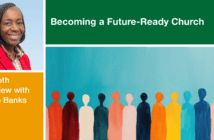Due to longevity, it’s not uncommon for four distinct generations of adults to be vying for leadership within our churches, says Melissa Cooper. She explores how the church can be a place of unity and reconciliation that uses the gifts of every generation.
This article was originally published on April 19, 2017.
In the 21st century, the church is facing a new challenge. Just a century ago, average life expectancy in the U.S. was about 50 years old. Today, it’s nearly 80. And for the first time in history, our society includes at least four distinct adult generations — the Silent Generation (born 1925–1945); Baby Boomers (born 1946–1964); Generation X (born 1965–1981); and the Millennial Generation (born 1982–2001). Never have we had this many generations sharing leadership in society, in the workplace, and in the church.
We must understand that each of the generations in our communities is its own unique culture. The experiences, practices, language and customs of each generation are distinct. When someone says, “I don’t understand kids these days,” they’re probably exactly right. The experiences and worldview of an 18-year-old and a 68-year-old are foreign.
How can we include all generations in leadership in ways that use gifts and talents to benefit God’s purposes?
Sometimes division among generations erupts into contentious debate over worship style, music, age-level programming (or lack thereof), and even facility usage. These conflicts stem from more than preference or personality differences. Sometimes, generational differences are the root cause.
So, what do we do about this? Can the church be a place of unity and reconciliation? How can we include all generations in leadership in ways that use gifts and talents to benefit God’s purposes?
Cross-Cultural Understanding
We clearly have some work to do to bridge generational divides in a way that appreciates what we all offer. We should spend time learning each other’s customs, priorities, perspectives, language, and experiences. Instead of finding differences threatening, we should learn about our unique characteristics, embrace the different perspectives each generation brings, and learn from one another so that we can offer the best of ourselves to the church and the world.
Are there common characteristics that carry on from generation to generation? Certainly, but we must be sure also to learn about our distinctiveness. We need to learn the perspectives of other generations, and we must also spend time learning more objectively about our own generational perspective.
Often, when I’m teaching groups about generational characteristics, participants show up with the intention of learning more about other generations. What usually happens, though, is that they find themselves even more interested in the content related to their own generation. Biases they didn’t know they held are brought to light; perspectives and priorities they assumed were shared among all generations turn out to be unique to their generational cohort. Always, though, people walk away with a better understanding of where lack of generational understanding has created a barrier in their ability to collaborate with others. A little knowledge can go a long way.
The Importance of Relationships
More and more, we’re seeing both in theory and in practice, the answer for many of the church’s current and future challenges comes in the form of intergenerational relationships. Young people learn to worship God by being present when the community is worshiping. Young people learn to lead by working alongside leaders. Young people find their passions and callings when those of us older get to know them and recognize gifts in them that they might not see for themselves.
What do these have in common? They require relationship. Relationships are key, especially relationships across generations. If we are living in communities that value relationship as the foundation, we will seek to know one another better, generationally and individually.
So how are you seeking to know others and be known in your community? How are you building the relationships that lead to inclusiveness and intergenerational leadership?
This article is adapted from a two-part essay series “The State of Intergenerational Ministries” that appeared on the website of the Florida Conference of the United Methodist Church.
Related Resources
- Making Space for Faithful Following by Denise Janssen
- Next Generation Leaders by Susan Beaumont
- Intergenerational Ministry in the Small Church by Brandon J. O’Brien






